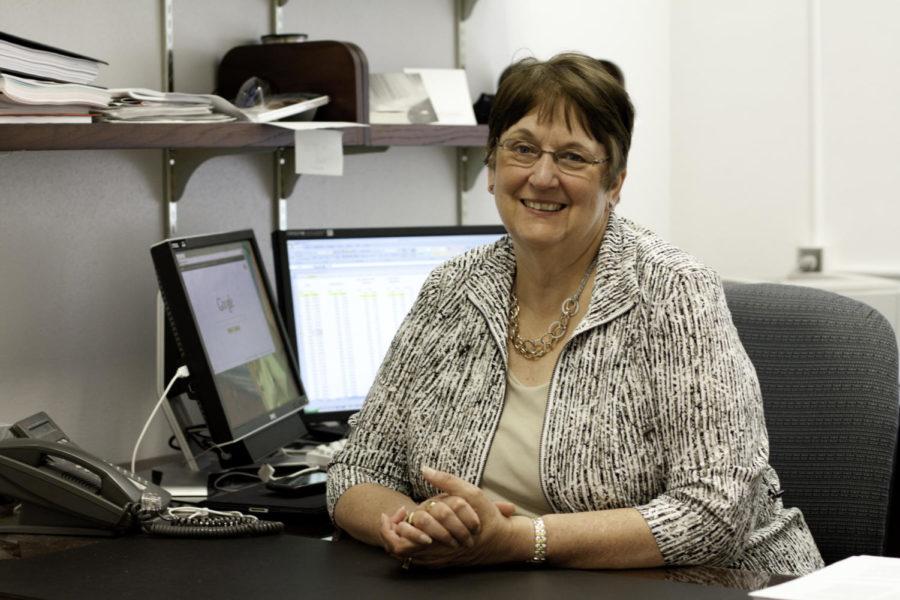Kathleen Jones reminisces 40 years at Iowa State
Photo: Megan Wolff/Iowa State Daily
Kathy Jones is retiring from her position as registrar and associate vice president for Student Affairs. She was registrar for more than 20 years.
June 22, 2012
On July 1, Iowa State will lose a valuable member of its staff when ISU Registrar Kathleen Jones retires from her current position. Jones has been registrar since 1996 but has worked at the university for 40 years.
Jones started her career after graduating in 1972 with a degree in math.
“I was in math education, but there weren’t a lot of teaching jobs back then, so I kind of floundered around for three months and eventually got a job in the registrar’s office as an entry level clerical staff,” Jones said. “I got that job, had it for four months and then just kind of moved up in the office.”
Because Jones has been working at the office of the registrar for so long, she was involved throughout the transformation from paper records to Iowa State’s current computer-only records. It started in the mid-1970s.
“We didn’t really have a plan for using those electronic records,” Jones said. “It was something we needed to do just because. We couldn’t be paper forever. Back then we couldn’t even imagine what we have today with everything being electronic.”
As everything needed to be changed manually back then, not everyone could turn up at the same time to make a schedule change, so turn cards were implemented. Students were given a time to go and make their changes. However, Jones remembered, they gave out turn cards all at once.
“I turned up at 6 one morning because I had to hand out turn cards,” she said. “I saw a line of students by the Union, and I laughed and thought, ‘What are all those students doing here?’ So we kept going, and the line was up to Beardshear and I thought, ‘Oh no.’ So I got to the door, and there were students with sleeping bags waiting for the door to open. Of course I had the building key. I realized after [my husband] dropped me off that they were waiting for me, and here I was laughing at all of these students. We don’t have lines like that anymore.”
By 1987, touchtone registration was introduced, with Jones’s help. This caused some problems for her and the registrar’s office, as Jones explained.
“Before [touchtone registration], the students would turn in their schedule requests to us, and then they would get their schedules in the mail,” she said. “They weren’t there when the computer made the changes, and if it needed to move stuff around, it did. By spring of ’87, we implemented touchtone registration. The students would call in on the touchtone phone, and then they had to identify themselves with a PIN and their SSN, and then they would start to add/drop.”
Jones said the university went completely to touchtone registration at one point.
“By ’87, we actually completely did away with the pre-registration and went cold turkey touchtone registration, so every student would build their schedule on the fly using touchtone registration on the phone. They were actually doing their registration online and getting immediate feedback. That was brand new to us, and we didn’t have a backup. That was pretty scary. The worst part was we didn’t know how to spread out the load. Touchtone registration really hit on the capacity of the phone system, in particular the Ames phone lines.”
Although this may not seem like a large problem, Jones continued to explain the repercussions of this first try at something new.
“We had some issues of people not getting a dial tone because the use was so heavy. I remember meeting with people from the phone company. Ames city individuals were not happy, because you need 911 service, and we were impeding that. And that was probably the worst day of my life, because we were so worried.”
Jones made sure that Iowa State was always one of the first universities to change and adapt to new technologies.
“I look back at how far we’ve come, and I think of where we started, and it’s almost overwhelming how much we got accomplished in 40 years. That’s my greatest pride. We were always early. We were never the first, but we were always early.”
Thomas Hill, vice president of Student Affairs, has worked with Jones for many years.
“We have an excellent working relationship. She is an outstanding individual and an outstanding professional,” Hill said. “She, along with everyone else, has done an excellent job.”
Laura Doering will be Jones’ successor, and Jones has high hopes for her.
“Laura’s been with us since 1996, and she is most recently senior associate registrar, so she knows the business of being a registrar.”
Although Jones will no longer be registrar, she will continue to work as associate vice president of Student Affairs until the position is filled later this year. Jones already has plans of what to do after she is retired.
“We want to go see all of the National Parks,” she said. “I’ll probably do a lot of traveling — miss at least one winter here. That will be nice.
“I love being registrar, that is my dream job. I didn’t even know about it until I worked here in 1972. But as I worked in this office and figured out this is really what I want to do, my goal was always to be registrar, and now I won’t be doing that anymore, and that kind of leaves a hole.”

















